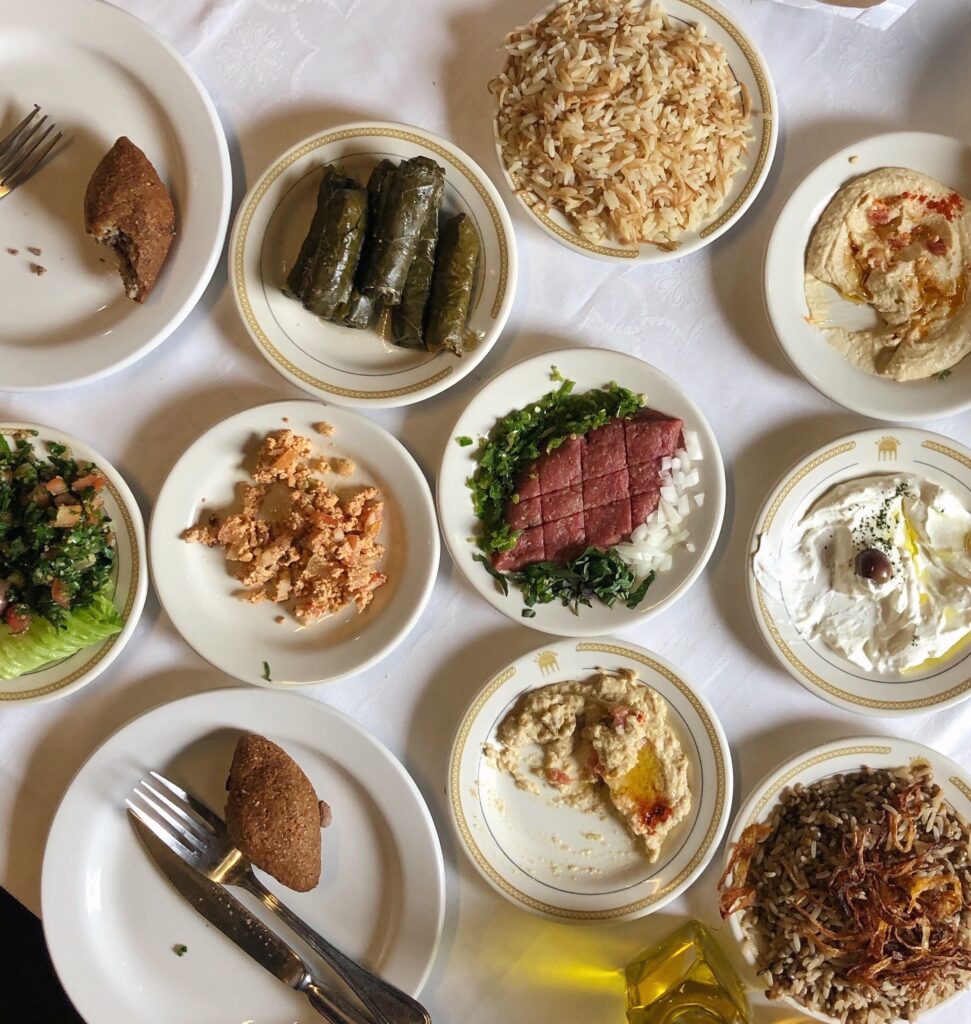Could Arab Cuisine Disappear? Keeping Its Delicious Legacy Alive

Lebanese Homemade Food. Photo: WikiMedia
By: Joud Sleilaty / Arab America Contributing Writer
The Treasure of Homemade Arab Cuisine
Arab cuisine is a culinary treasure globally known for its rich flavors and diverse dishes. However, underneath its renowed reputation, there’s a concern lingering: Could the cherished Arab dishes vanish over time? Arab cuisine isn’t only about what you eat in restaurants; it’s also about the cherished recipes cooked in Arab households. Growing up in Lebanon, I would visit my maternal grandmother’s house every day after school, where I would have lunch with my cousins. Additionally, Sundays meant a trip to my paternal grandmother’s house in the Bekaa, where my extended family gathered over a heartwarming lunch. Yet, as my parents worked and time grew scarce, the role of traditional home-cooked meals changed.
After moving to the United States, I found myself missing the flavors of Lebanese food more and more everyday. I went to Levantine restaurants hoping to enjoy the taste of Arab food, and despite the food being exceptionally delightful, the feeling of home was always missing. Nothing compared to the taste of both my grandmother’s dishes, prepared with love and care. Going back home to Lebanon during winter and summer breaks wasn’t just a heartwarming experience because of my reunion with my family; It also meant eating my grandma’s homemade food once again.
The Preservation of Arab Cuisine
While grandmothers have always been cooking experts, cooking skills among younger generations has been gradually declining over the years. As women rightfully attain equality, human rights, access to higher education, and improved work positions, the traditional role of women as homemakers is evolving. More women are joining the workforce, resulting in a decline in the practice of cooking. After spending a long day at work, cooking an intricate Arab dish sounds like a hassle and extremely time consuming. This causes the traditional complicated recipes that have been an important part of Arab culinary culture for years to vanish.
Unlike today’s documented recipes, grandmothers rely on memory, instinct, and the stories of past generations, passing on their recipes through practice. The absence of recipe books in their kitchen is both intriguing and alarming. The dishes that have been the centerpieces of family gatherings are often held within the memory of grandmothers, transferred verbally and through shared experiences. But with this, questions arise: Will these treasured recipes be lost because of the changing habits of modern times or are they going to be passed down to the future generations of grandmothers?
Balancing Tradition and Convenience
In Arab countries, a response to the changing dynamics has emerged in the form of catering services and pre-packaged frozen foods designed to accommodate to busy lives. However, the authenticity of the taste of these foods often remains elusive, especially since each family has their own way of making the traditional dishes. Similarly, in the Western world, attempts have been made to capture the essence of Arab cuisine in convenience foods, yet these still fail to replicate the honorary Arab cuisine born in the embrace of a grandmother’s kitchen.
The question remains: What does the future hold for Arab cuisine and its traditional recipes? The key is to find a way to connect today’s norms with what’s been treasured for ages. To keep the wonderful tradition of Arab cooking alive, we need to make an effort to learn the recipes from our parents and grandparents before it’s too late.
Conclusion
In conclusion, it is undeniable that Arab cuisine is disappearing. Beyond the restaurant scene, the authentic essence of Arab cooking traditions is found in the cherished recipes passed down through generations. Through my own experience with Lebanese cuisine, I have come to understand the urgency of actively preserving my family’s culinary traditions. This responsibility becomes even more pronounced as the evolving roles of women and modern lifestyles contribute to a subtle decline in the cooking skills that were once shared by our grandmothers. Accordingly, it also necessitates efforts by both men and women to ensure the preservation of family recipes. While Arab cuisine shares common threads, the taste varies from country to country, region to region, and even family to family. Therefore, the responsibility of ensuring the preservation of our own family’s recipes falls on each and every one of us.
Check out Arab America’s blog here!








